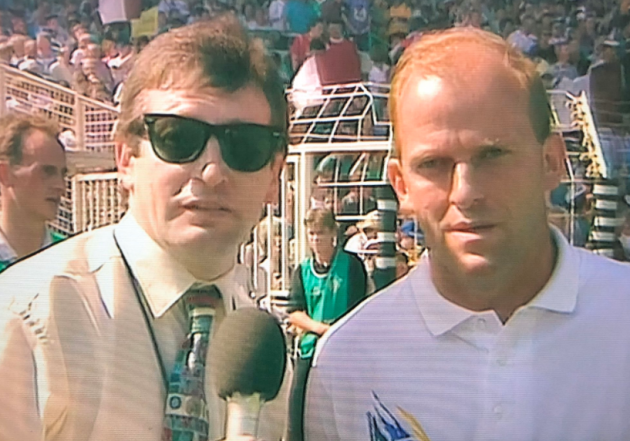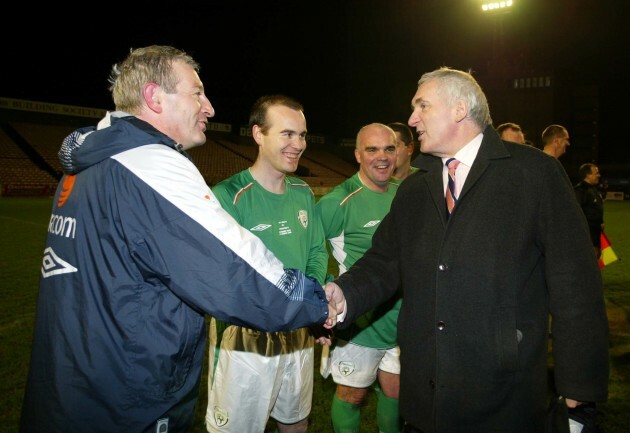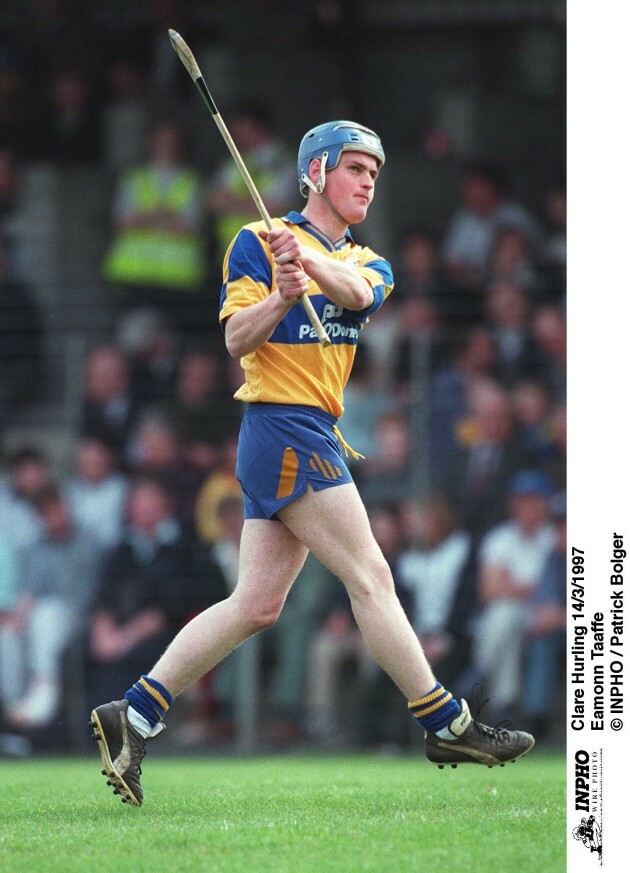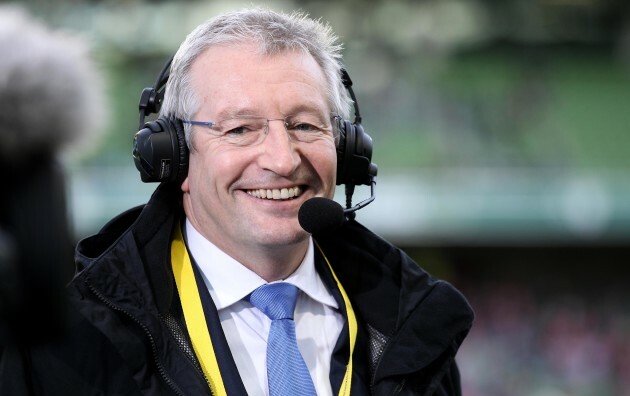TONY O’DONOGHUE can attest that it was a great time to be a GAA reporter.
The ending of famines, the freedom of fans to pour onto pitches at full-time, the unspoiled media access to players and management, and the uncompromising honesty that came with it.
At this remove, in 2020, the 90s and first decade of the 2000s mapped out a golden generation for Gaelic Games. Hurling and football appeared to attain perfection in those years.
At least that’s how the sports are remembered by those who are old enough to remember that time. The game seemed to reach top speed and players couldn’t evolve much more. Or so we thought.
Recent years have taught us just how much hurling and football have developed as a skill and a spectacle, although some will argue that the improvements have been achieved at the expense of the well-being of amateur athletes.
That shift has left many reeling for the purity of the GAA in the 90s. There’s been a lot of romanticising and eulogising about that period.
TG4′s All-Ireland Gold series offers reruns of the epic clashes that gave the 90s its reputation. The Irish TV station is rolling out those classic games more than ever in recent months.
But looking at those games again, almost three decades on, shows that quality of the matches were far from perfect.
The nostalgia is comforting though, particularly in these times and the drama remains undeniable after all these years.
O’Donoghue had a front-row seat for all of it. It surely was the best of times.
“These things are popping up left, right and centre. I’m kind of shocked initially,” O’Donoghue tells The42, who is more commonly known as RTÉ’s soccer correspondent these days.
I’ve put it on the record many times, I just think hurling in particular is God’s game. When played well, the elevator goes all the up to the top floor.
“Something very special when a hurling match takes off. The speed and the skill, and in the context of a Munster final, or an All-Ireland when the place is full, I honestly think it’s almost a spiritual experience.”
“I’ve been lucky enough to have been on duty for many many great football finals as well but it’s always the hurling ones that seem to be clearer in my mind.”
***
O’Donoghue was further reminded of his days on the GAA beat recently when some of the games he covered were shown on TG4.
On the back of that, someone tweeted a picture of him standing beside former Clare hurling manager Ger Loughnane before their 1995 All-Ireland semi-final against Galway.
His post-match interview with Waterford’s John Mullane after the thrilling 2004 Munster hurling final against Cork has also come through on his Twitter feed.
On the day we speak, O’Donoghue has just watched RTÉ’s recent Scannal programme which focused on the infamous Bertie Bowl, a venture which was spearheaded by Bertie Ahern during his time as Taoiseach.
O’Donoghue covered the dramatic chapters of that story as a soccer reporter. Watching the documentary, O’Donoghue was struck by the length of time he has been working in sports journalism.
He also saw his worlds collide as the tie he wore in that picture with Loughnane made an appearance on Scannal.
“It’s hard to believe that I’m around much longer than I think, I still think I’m a young fella,” he begins.
You know you’re old when you turn up on Reeling In The Years or Scannal or the TG4 All-Ireland Gold.
“My dress sense obviously hasn’t improved since 1995. What I noticed [watching Scannal] was a tie I was wearing in Croke Park, which drew some unsavourable comments when I was next to Ger Loughnane, reappeared in 2001 in an equally unflattering shirt, tie, jacket combo.
“The years haven’t taught me any lessons anyway,” he laughs.
O’Donoghue’s interview with Mullane in 2004 demonstrates just how much things have changed in the GAA. It’s no secret disconnect with the media has set in over the years since then.
In a recent edition of The42′s Warrior podcast, Sunday Times sports writer Denis Walsh recalls how he conducted one-on-one interviews with some of the Clare hurlers in the week leading up to the 1995 All-Ireland final.
He also mentions the diary that Liam Griffin wrote for the paper during the 1996 season when he managed the Wexford hurlers to All-Ireland glory. A universe away from the relationship that the GAA shares with the media now.
O’Donoghue enjoyed similar access as a GAA reporter in 2004.
And I was there..... the man with the 🧢 asking the questions 🎤 .... I love me job 😎 https://t.co/RLk3Cfa5NJ
— Tony O'Donoghue (@Corktod) April 23, 2020
For that Mullane interview, he selected the De La Salle star who had been sent off and was forced to look on as his side edged out Cork in a Munster final for the ages.
The exchange prompted one of the GAA’s iconic quotes, ‘I love me county.’
“That interview worked because I don’t think you’d be allowed interview a player who was sent off these days,” says O’Donoghue, laying out the unfortunate contrast between then and now.
“It worked because of the emotion, of the moment and of the crowd being there. It was just very special.”
When the field is full, it’s very hard to control what’s going on. I went looking for John because he was a central character in the drama. As we all know he loves his county.”
***
O’Donoghue has bags of stories from his years as a GAA sideline reporter. There’s the 1994 All-Ireland hurling final where O’Donoghue decided to pitch himself beside the Limerick dugout towards the end of the game for his post-match interviews.
The Shannonsiders were six points clear at the time, but two quick-fire goals were scored by Offaly to snatch a victory at the death. It became known as the five-minute final.
“Johnny Dooley got his famous goal,” O’Donoghue continues, “and then Pat O’Connor got his goal, and I’m shifting uneasily towards the other dugout and it’s Offaly.”
There’s also the 1995 All-Ireland hurling final between Clare and Offaly where O’Donoghue got a slight sting of the commentators curse.
He received information that Clare were preparing to take off Éamonn Taaffe in the closing stages. O’Donoghue relayed that message during the live broadcast, but seconds after reporting what he was told, Taaffe scored a crucial goal to help Clare to All-Ireland glory.
“Éamon Taaffe did get the goal and did later come off so the information I got was correct,” says O’Donoghue, taking up the story.
“I wasn’t worried at all, it added another level of drama and intrigue to it. He wasn’t to know I said that on air but he certainly made a name for himself.”
***
The origins of O’Donoghue’s time as a GAA reporter are rooted in the days he spent working in RTÉ Cork 89 FM. It was a local station in his home county, but it had the national broadcaster branding too.
His first time doing match commentary was for a Cork senior hurling championship game between Glen Rovers and Sarsfields.
“Justin McCarthy was my co-commentator, I was awful,” O’Donoghue recalls.
“That was a Glen Rovers team that had Tomás Mulcahy so that was probably why he was captain of the Cork team the following year in 1990.”
The 80s and 90s were exciting years for Cork hurling and football fans. The footballers shared an enduring rivalry with Meath which included three All-Ireland final meetings. The Royals won two of them before Cork prevailed in their third encounter.
There was also the famous double All-Ireland success achieved by both codes in 1990.
While O’Donoghue was still developing his trade and progressing as a freelancer for RTÉ, he was assigned to cover the highs and lows of that era for the Rebels.
Originally from the St Finbarr’s club in Cork, O’Donoghue had a personal investment in Cork’s cause.
“A reporter is so lucky to be on the sidelines of the drama, almost in the wings,” he says. “To be able to come down on the train with the Cork teams that time, to be on the open-topped bus as they went from Kent station in Cork up MacCurtain Street and to left across St Patrick’s bridge around to South Mall, it was just sensational.
“It just showed the power of it. The power of community, I suppose the joy of victory as well. Those are huge memories for me”
Some parts of Irish society are wedded to one sport. You can slot in the various stereotypes and prejudices on a map, but it was different for O’Donoghue. His upbringing encouraged him to develop a passion for all the sports. There were no divisions, no restrictions.
But he sometimes gets grief from the fans who stick with one sport and resent the rest.
“That was an element of Irish society that never appealed to me,” says O’Donoghue, still sounding dismayed by that mentality.
Some people in Croke Park, while you’d be working on All-Ireland final day, might say ‘ah sure you’re only a soccer man.’
“And then down the road in Dalymount Park, you could be doing a match there, and someone will go ‘ah look he’s a GAA man.’ I have to say, I give Cork great credit for this, I think there was an encouragement from our school and society that I knew, that people could play GAA, soccer, rugby, hockey, sailing.
“It was encouraged and a lot of communities don’t have that crossover, and there should be.”
***
O’Donoghue was diagnosed with cancer in 2011. He went on to have treatment and recover from an illness which his father died from when O’Donoghue was still just a teenager.
O’Donoghue was receiving medical check-ups every three to six months after getting the all clear, but last October, he got some encouraging news.
“My oncologist said ‘I’ll see you in a year,’ so that had me skipping away happy out.”
It’s relieving news for the Cork man, but the arrival of Covid-19 has sharpened his awareness for self-care. His medical history means he is immunocompromised, and upon medical advice, he is paying more than his due diligence to the social distancing guidelines.
“I definitely think men are getting better,” O’Donoghue responds when asked for a general overview of how men look after themselves in today’s world.
Women are much better at this. They talk to each other and they’re encouraged with breast checks and cervical checks. Men still, and perhaps men of a certain age, aren’t talking as much as they should.
O’Donoghue is now the soccer correspondent for RTÉ, but there was a time when he was still able to fit in some GAA work in his schedule.
He would sometimes return home from covering a soccer international in time to make a quick dash to Croke Park and cover the All-Ireland final day. But he works across television, radio and online platforms now. There’s no room to make time for GAA reporting anymore.
He still loves to attend games as a fan but he was unable to make any of them last year. Indeed, it’s a comparably different GAA media landscape to the one he remembers, but he still misses what was a great time in his career.
“GAA, and hurling in particular, I absolutely miss. Obviously Cork is my first love but every year I would try to go as a fan to see games.
“When you’re travelling and lucky enough to be with Dundalk [when they're] playing in European competition, or when you’re at League of Ireland games, I can’t complain about my job. But I would love to get to see more GAA, that’s for sure.”
The42 is on Instagram! Tap the button below on your phone to follow us!




